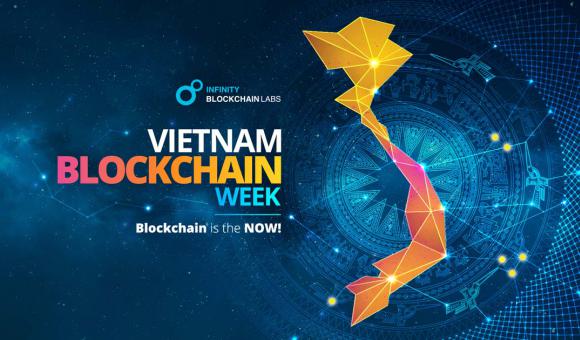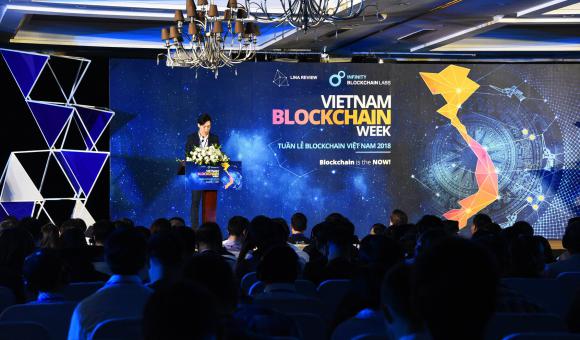Vietnam Blockchain Week19/03/2018
On the 7th and 8th of March 2018, Camille Borcy, intern at AWEX office in Saigon, attended the first major conference about blockchain in Ho Chi Minh City, Vietnam. The Infinity Blockchain Lab, host of the event, welcomed world's tech leaders, well-known blockchain experts, brilliant entrepreneurs and other public figures coming from all over the world to let them share their knowledge about different subjects related, be it closely or loosely, to blockchain.
What is blockchain all about?
The blockchain technology is actually a software platform for digital assets. As its name suggests, it is a chain of blocks that contains information. By using maths and cryptography, blockchain provides an open, decentralised database of every transaction involving value (money, goods, property, etc.). It implies that there is no use of a central entity to manage the chain, but the use of a peer-to-peer network and so, each member of the community can verify the authenticity of the record. Anyone having access to the Internet can get involved in blockchain based transactions. There are two types of blockchains: the private and the public blockchain. Both are decentralised peer-to-peer networks and guarantee the immutability of the ledger. The difference between them lies in the participants in the network. A public blockchain allows anyone to participate and is completely open while in a private blockchain the person needs to obtain an invitation to join the network and must then be validated.
Blockchain for what?
Blockchain was originally developed for the digital cryptocurrency Bitcoin. But today, it goes far beyond than that and so blockchain begins to be applied in all subject areas, from finance and trade to healthcare and education.
Blockchain is also used for smart contracts that are similar to contracts in the real world, but are completely digital. Smart contracts do not require a third-party since they are stored on a blockchain and so, everything is distributed and immutable. Ethereum for example, an open software platform based on blockchain technology, was specifically developed to support smart contracts.
Furthermore, blockchain could provide solutions for government issues. As far as education in concerned, the technology could for example help verify factual qualifications of students and this data would thus be used by investors who are looking for perspective thesis or by universities who need to make a decision for accepting credits for previously studied disciplines. In the field of public health, healthcare plans, medical prescriptions, accounts of drugs could be tokenized in a unified registry and unauthorized change, access and use of citizens’ data would become impossible. Blockchain could also help in the registration of author’s rights and intellectual rights. A revolution in the voting system could also be brought with no more rigging of votes, no hackers’ intervention, no situation where minority chooses for majority; every vote would be transparently counted. In short, blockchain would be beneficial to address government’s issues in many areas and this is something that Estonia has already understood since the country starts to implement the technology on state level. Other fields are also concerned by the application of blockchain: the review industry, the supply chain finance, e-commerce, KYC, etc. More abstractly, blockchain could reinforce security due to its immutability, strengthen privacy, boost efficiency, enhance transparency, accelerate transactions and reduce their costs, disrupt the status quo by decentralising everything and letting users control the networks. However, since blockchain is a pretty new technology that crosses jurisdictional boundaries, it can pose a number of complex legal issues. Finding the appropriate governing law is crucial to regulate this technology.
Could the blockchain technology be applied in Vietnam?
In Vietnam like in many countries of the region, the blockchain technology could be applied to the public sector: real estate registration, marriage registration, copyright management, birth certificates, etc. The technology could not only be a means to improve supply chains and so increase traceability, but could also contribute to overcome the climate crisis and water crisis. Actually, the possibilities of application of the blockchain technology in Vietnam are wide and could help the country build a better future.
All things considered, the Vietnam Blockchain Week is an event that addressed a large number of aspects of the blockchain technology and helped discover companies and start-ups specialised in this field. Vietnam was chosen to welcome this unique conference due to its great potential in terms of blockchain application. The country has indeed one of the fastest growing economies in the world and is now progressing in the world’s information and communication industry. Universities are now giving blockchain classes to students. With a young population and a high level of technological engagement, Vietnam has become extremely attractive for future blockchain businesses and investors. This technology is expanding in the country and involves many companies, institutions and organisations. The application of blockchain in Vietnam is thus an opportunity that could largely contribute to the country’s future development.
Want to learn more about Blockchain Technology?
· http://blockstrap.com/en/a-complete-beginners-guide-to-blockchain-technology/
· https://www.coursera.org/learn/cryptocurrency
· http://www.moocblockchain.com/17/mooc-blockchain-particuliers
· https://www.youtube.com/watch?v=SSo_EIwHSd4&t=65s
Wrapped-up by Borcy, reviewed by Piérart

